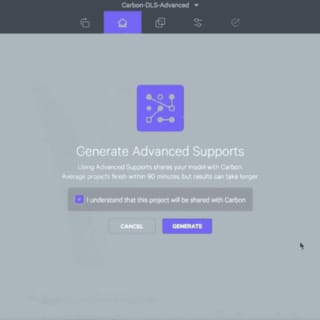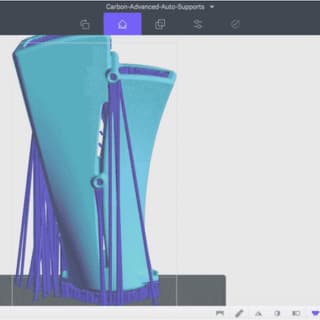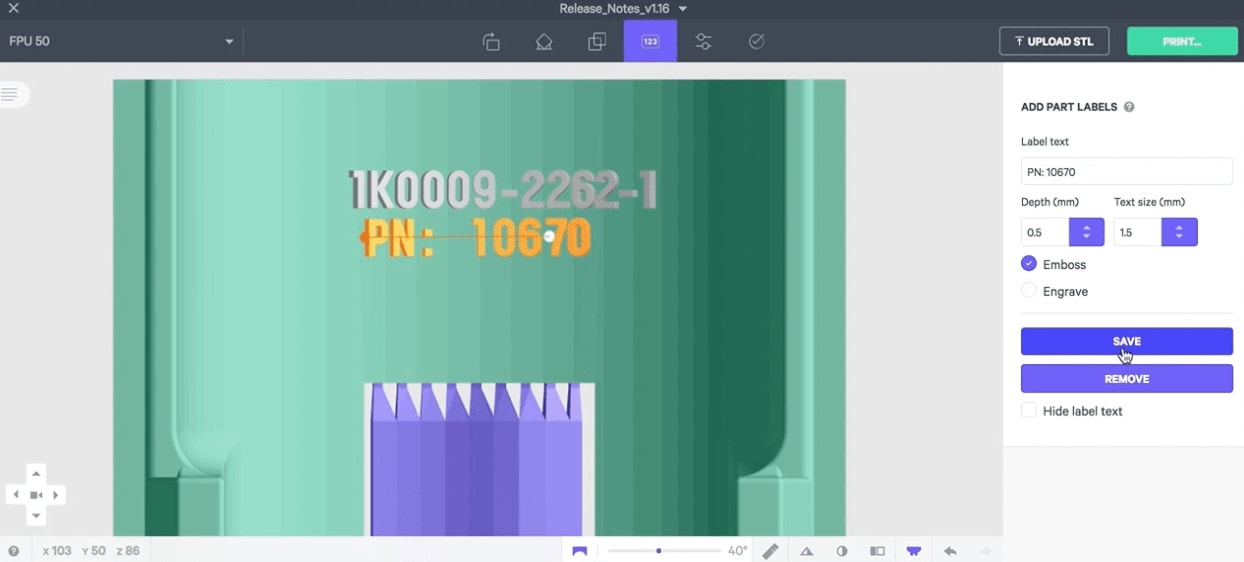Carbon recently announced two tools that will improve the manufacturability of parts using Carbon’s Digital Light Synthesis™ technology. These significant additions also underscore Carbon’s commitment to create innovative, previously unavailable software tools. The Advanced Auto Supports tool improves the manufacturability of parts and the ease of 3D Manufacturing. The Part Serialization tool helps with operational efficiency, which enables easy part-data tracking and potentially simpler data integration of 3D manufactured parts into industry standard supply-chain processes and ERP systems.
Read this solution brief to learn more about our two newly launched software tools:
- Advanced Auto Supports
- Part Serialization
“Advanced Supports helps our team evaluate and iterate through designs for complex parts with more confidence and less manual labor. We can simply be faster!”
Matthias WeiskopfSVP Advanced Engineering, Oechsler
INTRODUCING ADVANCED AUTO SUPPORTS
Customers have the ability to use the Advanced Auto Supports feature and manufacture DFM optimized parts on Carbon M Series printers with a click of a button. Typically, finite element analysis (FEA) simulations help to identify potential failure areas and stress areas. The FEA simulation is also the brains behind the recently launched Advanced Auto Supports feature (Figure 1). Once these issues are addressed, customers can achieve higher first-time manufacturability of the parts and avoid material wastage. The parts manufactured using Advanced Auto Supports have inherent advantages. Some of the expected benefits with this feature are:
- Parts have higher first-time manufacturability, resulting in more efficient utilization of labor and materials.
- The supports are easier to remove.
- The structures are tuned based on the mass of the part.
- The support structures are usually better placed than those placed by even highly trained engineers because Advanced Auto Supports simulates the printing process and diligently places only the necessary supports on a part.
- The structures placed by Advanced Auto Supports are superior: the tips have been optimized for easy removal, for strong support, and for better final surface finish.
- The unique characteristics of each material in its green state are considered in how the software places the advanced auto supports.


Figure 1: With the click of a button, customers now have the ability to add FEA optimized Advanced Auto Supports.
Some of the salient features of the new tool are:
SIMULATION BACKED
Using FEA, Advanced Auto Supports simulates the forces that parts undergo during the printing process. The simulation even takes into account the material used to make the parts. Based on these simulations, Advanced Auto Supports identifies the areas (Figure 1) of the part where supports are needed to buttress the part against the forces encountered.
DESIGN IMPROVEMENTS
DFM tools are fundamentally designed with customer success in mind. Because the FEA simulation identifies potential issues such as failure zones or high-stress zones early on, it creates an unparalleled opportunity for product design teams to fix the design before committing valuable printer time, resin, and labor.
FAST, CLOUD-BASED, AND SECURE
Complex FEA simulations typically require substantial computing power. To speed up these simulations, Carbon uses an elastic, cloud-based computing architecture. Comparable FEA software packages that simulate other plastics manufacturing methods can take days to run, and fail without warning. Carbon’s cloud-based analyses finish in hours, and often within 90 minutes. This helps engineers to iterate product designs rapidly, ensuring customers print parts easily and successfully the first time, with minimal post-processing.
The Advanced Auto Supports tool leverages the existing Carbon-managed servers in the cloud, and all communication is through a secured and encrypted tunnel. This is the same architecture covered by Carbon’s printer subscription agreement, and includes the protections of the NDA.
FITTING INTO CUSTOMER WORKFLOW
No new software package or installations are needed to access the tool. It fits right into an existing workflow. The median length of jobs that Early Access customers have submitted is ~90 minutes. Exceptions include parts with many triangles and features, or parts that are very large and tall. Such parts can require more processing. Additionally, parts being printed using elastomeric materials can take longer to simulate because they behave in a more complex way during the printing process.
INTRODUCING PART SERIALIZATION
In addition to the Advanced Auto Supports tool, Carbon also has introduced a new Part Serialization tool to improve the operational efficiency around part tracking. The new Part Serialization tool supports digitally adding a part-specific serial number. Customers can now digitally track the products from the creation stage on the printer platform through to the final usage using the new Part Serialization tool (Figure 2). The feature is especially useful for customers in medical, dental, automotive, and consumer products verticals that need a robust system of records to track the part history. Additionally, tracking part provenance and complete manufacturing history is also a requirement in highly regulated industries.
The tool offers customers a method to add a serial number to parts or build a number from dynamic data, such as:
- The printer’s serial number
- The project ID
- The print ID
- Or, customers can add a full serial that includes all of these identifiers

Figure 2: Add labels to your parts: either dynamically generated (at print time) information or static text (such as a part number).
Dynamic generation of part serialization labels is a difficult industry challenge. Traditional approaches to add a unique ID for every 3D printed part are cumbersome, expensive to pre-configure, and typically end up with a unique input file per part. For parts manufactured using traditional approaches such as injection molding and casting methods, adding serial numbers involves expensive post-processing steps such as etching, engraving, or sticking a label. With Carbon’s tool, adding serialization is essentially free and manufacturers for the first time have access to a capability that previously required overhead cost and resources.
Carbon’s software solves these problems and offers the ability to apply the correct serial number at the last moment in a way that corresponds exactly to the print ID that can be used to track the part later. Moreover, the tool offers flexibility in placement, has the ability to follow curves and curved surfaces (Figure 2), and can even engrave surfaces that are directly attached to the platform.
Additionally, Carbon’s software offers traceability that can extend all the way from the printer level to the post-processing workflow. For example, an automotive customer can trace back which printer was used to print a connector part at which time, day, as part of which project, and even trace the specific wash cycle the part received. In situations such as product recall, serialization and the associated digital thread can be of significant benefit to firms because they now have complete visibility into the percentage of parts that were impacted due to any particular quality issue. Recalls would be limited to the affected parts only. Currently, businesses lose a lot of time and money every year due to lack of this visibility, and therefore end up recalling a much larger percentage of parts.
CONCLUSIONS
The latest FEA Advanced Auto Supports tool is testimony to our efforts to ensure customers can print parts easily and successfully the first time using Carbon’s M Series printers and materials. Moreover, leveraging secure tunnels to run complex FEA simulations in the cloud demonstrates that Carbon’s computing architecture is designed with at-scale production in mind. Part Serialization delivers digital provenance on 3D manufactured parts and will be useful across industry verticals.
Interested in designing and manufacturing differentiated products with Carbon’s Digital Light Synthesis™ technology with the most advanced software features? Contact us at sales@carbon3d.com.